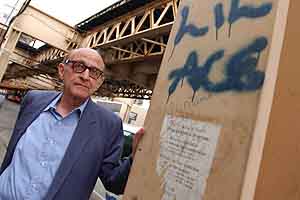Conference will recognize Spergel’s gang prevention work within urban communities
By William HarmsNews Office
 Irving Spergel | |
A conference in honor of Irving Spergel, the George Herbert Jones Professor Emeritus in the School of Social Service Administration, will begin at 8:30 a.m., Friday, Jan. 20, at the School of Social Service Administration. The session titled “What Works: Addressing the Community Youth Gang Problem in the United States,” will recognize Spergel’s career in leading research on gang prevention.
Spergel and his colleagues developed a model including intervention and suppression, sometimes called the Comprehensive Community-wide Gang Model, the Intervention Model or the Spergel Model, which calls for a coordinated effort against gangs characterized by community organization and neighborhood mobilization; social intervention and opportunities provision, including jobs, job training and education; suppression, including arrest, incarceration and supervision; and organization development that facilitates the modification and implementation of other programmatic strategies.
Spergel describes the model in his book: The Youth Gang Problem: A Community Approach, published in 1995. The U.S. Office of Juvenile Justice and Delinquency Prevention implemented it in six communities in the United States, from 1992 to 1999, proving through quasi-experimental evaluations that the model was successful when correctly implemented.
A test of the model in Little Village Chicago, described in his book Reducing Youth Gang Crime, to be published later this year, demonstrates a 40 percent reduction in serious violence for 200 program youth, compared to an equivalent sample of non-served gang youth from the same gangs over a five-year period. Reductions of serious gang violence were achieved at the community level and also on a relative basis, compared to six similar high gang crime communities in Chicago.
In Riverside, Calif., for instance, youth in the program were three times more likely to avoid becoming involved in violent crime than comparison youth not in the program. The U.S. Office of Juvenile Justice and Delinquency Prevention initiated 20 new sites that use Spergel’s approach.
Spergel became interested in research on gangs while working with gang youth from 1952 to 1960 as part of the New York City Youth Board, an agency he joined after doing social work in Wilmington, Del. and New York City.
He received a B.A. in Social Sciences in 1946 from City College of New York, a M.A. in Social Work in 1952 from the University of Illinois and a Ph.D. in Social Work in 1960 from Columbia University.
Spergel joined the University faculty in 1960 and was named the George Herbert Jones Professor in 1993.
Spergel has authored, co-authored and edited six books on street gang intervention, including works on community mobilization and gang problem solving.
Leaders from around the country who have worked with Spergel on gang intervention and suppression will speak at the conference, as will academics doing research in the field. Barbara McDonald, former Deputy Superintendent for the Chicago Police Department, is among the speakers to address the conference.
Chicago faculty members Robert Chaskin, Associate Professor in the School of Social Service Administration, and Randolph Stone, Clinical Professor in the Mandel Legal Aid Clinic at the Law School, also will present lectures.
Jeanne Marsh, Dean and the George Herbert Jones Professor in the School of Social Service Administration, will open and close the conference with remarks and Provost Richard Saller will comment at the conference. For additional information, contact Jamie Stanesa at (773) 702-4334.
![[Chronicle]](/images/sidebar_header_oct06.gif)